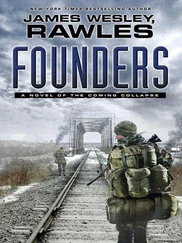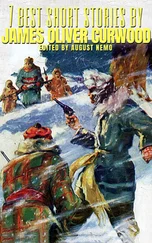Joshua nodded and sighed. “So no good-bye parties for us. We’ll roll out of here before 0200. I’m going to miss you, Dustin.”
Dustin gave Joshua a hug and said, “I’m going to miss you, too, bro. Give Ken and Terry my regards.”
“Will do. Thank you for all your help.”
Dustin bent down to shake hands with Leo and Jean, and said, “You boys are going on a big adventure with your mom, dad, and auntie Mal. Make me proud, and behave yourselves.”
Leo said gravely, “We will, sir.”
Dustin gave Malorie and Megan hugs, and then said, “Well, I’d better get back to the station before the shift change. I’ll be praying for you. Don’t blow OPSEC and try to contact me until Maynard Hutchings and his band of fools are in prison, where they belong.”
As they backed the pickup up to the garage, Joshua said to Megan, “We need to act fast. Sheila’s store closes in less than one hour.”
Joshua unloaded all of the gas cans into the garage while Megan and Malorie gathered all of the items that they had accumulated in the past seven months that they wouldn’t need or couldn’t carry on their upcoming trip. They loaded everything in the pickup, including a push lawn mower, a hibachi barbecue, a shovel, a hoe, a spading fork, a stiff-tined garden rake, a leaf rake, a wheelbarrow, a pressure canner, three cases of canning jars, two bicycles, a wood-splitting maul, some clothes and shoes that Jean had outgrown, two boxes of books, a wooden clothes-drying rack, a washtub, a washboard, and a four-gallon earthenware crock.
Megan and Joshua went to the store while Malorie stayed at home with the boys and continued to pack. She also pulled the guns, ammo, magazines, and false IDs out of the wall cache.
Joshua pulled the pickup up in front of the store at 4:52 P.M. They were relieved to see that Sheila had not yet closed the store. When they walked in, she was behind the counter working on her ledger. There was no one else in the store. Megan knew that Sheila was a resistance sympathizer, so she was direct. She said, “We’ve been told that we’re under suspicion, so we’ve got to get out of Dodge City tonight.”
Sheila nodded.
Megan asked, “Can we trade our heavier possessions for seeds and other compact, lighter-weight trade goods?”
“Yes, but it’ll have to be at a discount. You see, by taking trades like that, I’ll be violating one of the cardinal rules of barter, which is, ‘Don’t trade hard for soft.’”
Megan gave Sheila a puzzled look.
“Okay, let me explain,” Shelia said. “In barter, if what you’re offering in a trade is a compact, durable item that is in short supply, or something that is otherwise highly valued, then a savvy barterer doesn’t make the mistake of trading it away for items that are less durable or less desirable. That is trading hard for soft. Otherwise, at the end of the day, your counterpart will be going home with the better goods than you. The only exception to this rule would be if your counterpart is willing to trade a much greater quantity of his items and you know that you have a ready market for them. A corollary to this rule is that ‘it’s better to trade your bulky for his compact.’ Or, as one old gun show dealer I met said, ‘Don’t never trade away handguns for rifles or shotguns.’”
Megan said, “Okay. Understood. I’m willing to trade at a deep discount.”
“Go ahead and bring in what you have to trade.”
As Joshua started to unload the back of the pickup, Sheila flipped around the sign on the front door from OPEN to CLOSED.
With three of them working, the pile of tools and other barter items rapidly grew in the middle of the store’s sales floor.
Sheila sized it up and said, “Okay, this is better than I had expected. We can negotiate swaps for each item individually, or we can expedite things by just calling all of this a $5.25 silver coin purchase credit.”
Megan said, “I vote for expediting things.” Joshua nodded in agreement. Megan stepped forward to shake Sheila’s hand, and said firmly, “Deal.”
To use their purchase credit, they settled on eight AA rechargeable Sanyo Eneloop batteries, a 12V DC AA battery charger with a cigarette lighter plug, two cans of dark brown spray paint, a large roll of masking tape, a U.S. road atlas, and a box of fifty .22 LR cartridges. Together, those purchases came to $4.75 in silver coin. They used the rest of their purchase credit on some packets of nonhybrid carrot, squash, lettuce, and celery seeds. These were all varieties that would grow well in northern climates.
Once they were back at the house, they packed everything that they had originally brought with them to Bradfordsville, including the deer carts, in case they might have to abandon the pickup at some point and continue on foot.
As Megan and Joshua filled all of their canteens and laid out items to pack by the door that connected the living room to the garage, Malorie checked out the pickup and took it on a short test drive.
She returned and started looking under the hood. Meanwhile, Joshua used some 409 spray cleaner and rags to carefully wash the portions of the door panels that had the painted advertising text and logos. He then neatly masked off rectangles around them, backed with scrap paper left over from Jean and Leo’s homeschooling, to protect from overspray. Two coats of paint, with a twenty-five-minute delay between the first and second coats, made the Chem-Dry logos and the area code 270-prefix phone numbers disappear. The rectangles were a full shade darker than the rest of the truck, but at least the truck now looked much less distinctive. Once the paint was dry, Joshua peeled off the masking tape and scrap paper and put them in a paper bag, along with the empty spray-paint cans. Megan was about to toss this in the trash can, when Joshua snatched it away, and said, “We can’t leave clues like that around for the MPs.” He stowed the bag next to the gas cans in the bed of the pickup.
As they positioned a sheet of scrap cardboard over the two rows of gas cans, Malorie rattled off a report on her inspection of the pickup. “There’s no time to drop the transmission pan, but the color of the transmission fluid on the dipstick looks decent, and it shifts smoothly. The oil was one quart low, and with a hundred and ninety-two thousand miles on the clock, I suspect that it’s starting to burn some oil. The oil didn’t look dark. The tires are in fair shape and their pressure was fine except the left rear, which I brought up with the hand pump. The engine compression seems decent, and the serpentine belt should be good for several thousand more miles. The body is in fair shape but the rear wheel wells are rusted out. The shocks are iffy, but with the load we’ll be carrying, they should suffice. The gas gauge reads seven-eighths full, if that can be trusted. I checked the owner’s manual, and that shows this rig has a twenty-eight-gallon tank. Conservatively assuming fifteen miles per gallon on the highway, that gives us a four-hundred-twenty-mile range. Those five-gallon cans will provide another seven hundred fifty miles. Not bad. The power steering fluid is a bit on the dark side, but the power-steering pump itself doesn’t sound noisy. No noise from the water pump, either. There is a little slop in the steering wheel, but it’ll do. The brakes seem firm, and while I’d prefer to pull the hubs to do an inspection, there’s not enough time. The battery has full cells, but the terminals look a little snowy. Hoses look good and feel supple, but you never know with a vehicle that’s been parked for a long time. In summary, I’d say that whoever owned this pickup must’ve taken pretty good care of it—at least mechanically. Too bad that it isn’t four-wheel drive, but beggars can’t be choosers.”
Читать дальше












